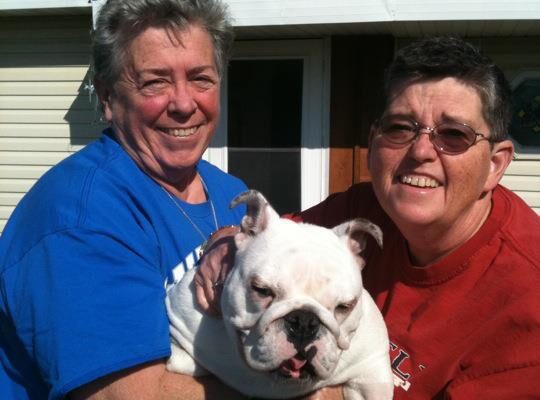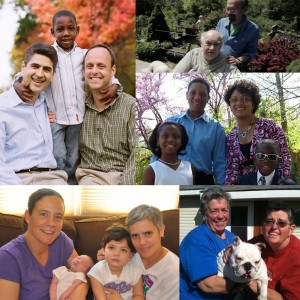Lynn Sprout and Kathie Spegal are all about family. Enter their home in a quiet Champaign neighborhood and you see the signs of their love for family everywhere – photos, knickknacks and mementos of family gatherings. When their family gathered for Easter this Spring, there were 22 children, grandchildren (aged from 22 to 6), spouses and guests. They are looking forward to a new grandchild this June. Though these children come from Lynn and Kathie’s previous relationships, their families are completely integrated. The family has grown so large that Kathie and Lynn simply are no longer able to host all the guests and visitors in their house, so they have instead have to plan their get-togethers when they can do them outside.
Lynn is a registered nurse and works at a federally qualified health center. She met Kathie in October in 2001 at church, where Lynn was attending a support group after losing her long-time partner Linda, after an extended illness. Linda’s death was very difficult for Lynn. She lost her job at a local hospital after they denied family leave to care for Linda, and faced challenges to her ability to make decisions about Linda’s body and have their family recognized in an obituary after Linda passed away. Worst of all for Lynn, she says, is that “my children were harmed. Linda was very important to my children. But because our relationship was not a marriage, they were treated like they’d suffered no loss at all.”
“I don’t want that to ever happen again.”
After meeting in the support group (which they still attend together), Kathie and Lynn began to see one another and fell in love. On June 14, 2003, with family and friends, they celebrated their love and lifetime commitment at the McKinley Presbyterian Church in Champaign – the place where they met.
The ceremony was joyous for Lynn and Kathie, since they were able to proclaim their love for one another publicly.
Kathie, a case manager, wants to insure that she, Lynn, and their children never have to go through anything as agonizing as Linda’s death again. She’d hoped that Illinois’ civil union law would make things better, but she has learned that “civil unions just are not enough.” Kathie notes that civil unions are just “less than marriage” and observes that they are reminded of that in many small ways – forms that don’t allow for a civil union, people who don’t understand what it is, and acquaintances who are not certain how to respond to the fact that she and Lynn have a civil union.
“We are in love,” says Kathie. “We want to be married. That is what people in our family who are in love do.”


